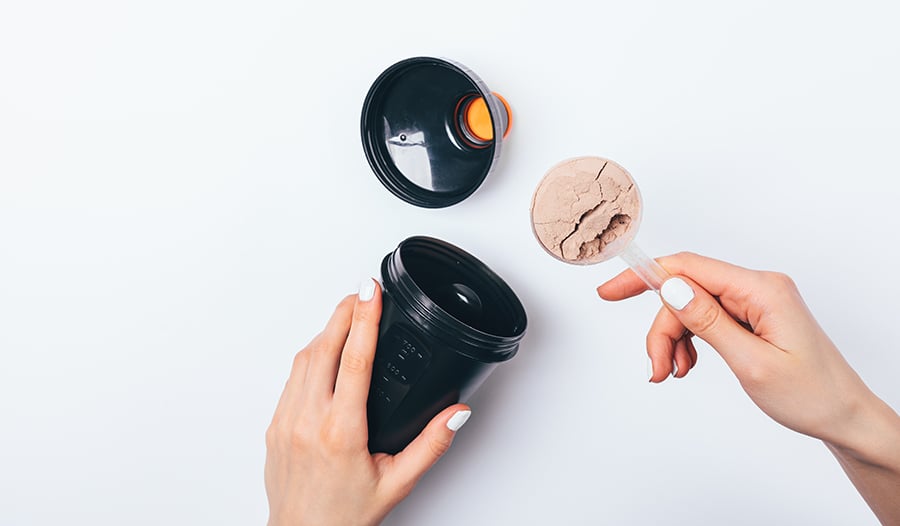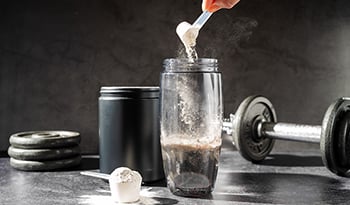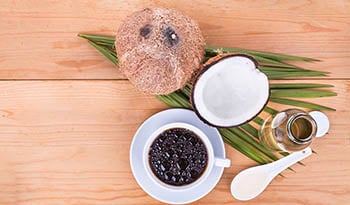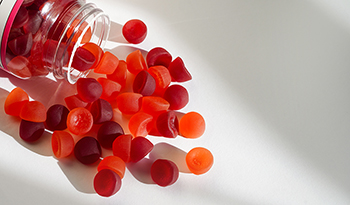Korzyści z białka: Czy niedobór białka może wpływać na nastrój? + Wskazówki, jak poprawić zdrowie psychiczne

Białko a twój nastrój
Istnieje wiele sposobów na naturalne poprawienie nastroju, od ćwiczeń, przez prowadzenie dziennika, po medytację. Ale czy wiesz, że Twoja dieta - a dokładniej spożycie białka - może również wpływać na Twój nastrój?
Zanurzmy się i zbadajmy, na poziomie molekularnym i praktycznym, w jaki sposób białko, które spożywasz, wpływa na aspekty twojej fizjologii, które bezpośrednio wpływają na twój nastrój. Przedstawię również praktyczne wskazówki, dzięki którym będziesz mieć pewność, że każdego dnia dostarczasz organizmowi odpowiednią ilość białka.
Białka i neuroprzekaźniki
Białka są dużymi cząsteczkami zbudowanymi z mniejszych substancji zwanych aminokwasami.1
Te aminokwasy, które otrzymujemy z białka, pomagają wytwarzać neuroprzekaźniki - chemiczne przekaźniki układu nerwowego.
Neuroprzekaźniki dostarczają istotne sygnały do mózgu i innych tkanek, które pomagają nam wykonywać najważniejsze funkcje życiowe - od poruszania mięśniami po skupianie wzroku.2 Jeśli chcesz zagłębić się w naukę, starszy badacz z Laboratory for Integrative Neuroscience w National Institutes of Health napisał obszerny artykuł na temat kluczowej roli neuroprzekaźników w utrzymaniu mózgu i zdrowia psychicznego, który da ci do myślenia!3
W tym artykule zagłębimy się w specyfikę dwóch neuroprzekaźników, które mają duży wpływ na depresję i lęk: dopaminy i serotoniny.
Dopamina - neuroprzekaźnik "dobrego samopoczucia"
Dopamina jest jednym z neuroprzekaźników, które pomagają nam czuć się szczęśliwymi. Od zabawy z uroczym szczeniakiem po zdobycie nagrody, dopamina pomaga nam czuć się dobrze - ale robi też znacznie więcej!
Badania pokazują, że dopamina odgrywa ważną rolę w regulacji zachowania i poznania, ruchu, motywacji, kary i nagrody, snu, marzeń sennych, nastroju, pamięci i uczenia się.4 Dopamina jest silnie związana ze zdolnością do zwracania uwagi, a naturalne zwiększenie poziomu dopaminy jest skutecznym sposobem leczenia zespołu nadpobudliwości psychoruchowej z deficytem uwagi (ADHD).5
Dwa składniki mają znaczenie, jeśli chodzi o naturalne wytwarzanie dopaminy z pożywienia: tyrozyna i witamina B6. .
Tyrozyna
Tyrozyna jest aminokwasem występującym w pokarmach bogatych w białko, takich jak mięso, fasola, jajka, sojai nabiał. Jest niezbędnym składnikiem nie tylko dopaminy, ale także epinefryny i norepinefryny.
Witamina B6
Witamina B6 znajduje się w pokarmach bogatych w białko, takich jak ciecierzyca (znana również jako fasola garbanzo), wątroba wołowa, tuńczyk , łosoś . i łosoś . . Może być również przyjmowany jako suplement.
Jeśli myślisz o suplementacji B6, szukaj fosforylowanej formy, znanej jako P5P lub pirydoksal-5-fosforan. Istnieją pewne dowody na to, że ta forma jest łatwiej wchłaniana i wykorzystywana w organizmie niż inne formy B6.
Białko i serotonina
Serotonina jest również neuroprzekaźnikiem, który, podobnie jak dopamina, jest silnie zaangażowany w regulację twojego nastroju, zachowań i pamięci.
Możesz być zaznajomiony z serotoniną, jeśli ty lub ktoś z twoich bliskich stosuje SSRI (selektywne inhibitory wychwytu zwrotnego serotoniny), najczęściej przepisywane leki przeciwdepresyjne. SSRI są również przepisywane pacjentom cierpiącym na zaburzenia psychiatryczne i neurologiczne, w tym zaburzenia lękowe i zespół stresu pourazowego (PTSD).
Serotonina działa na receptory w mózgu, które pomagają nam przetwarzać myśli, ruchy, równowagę energetyczną i apetyt, żeby wymienić tylko kilka!6 Oznacza to, że serotonina pomaga nam czuć się lepiej i umożliwia nam wykonywanie zdrowych nawyków, które sprawiają, że jesteśmy szczęśliwi, takich jak prawidłowe odżywianie, ćwiczenia i inne. Porozmawiajmy o transakcji dwa w jednym!
Serotonina jest wytwarzana z tryptofanu (aminokwasu występującego w pokarmach bogatych w białko), witamin B12 i kwasu foliowego, żelazai cynku. Zapewnienie 100% dziennego zapotrzebowania na białko jest doskonałą strategią dostarczania wystarczającej ilości powyższych składników, ponieważ aminokwasy zwykle znajdują się w żywności o wysokiej zawartości witaminy B12, kwasu foliowego, żelaza i cynku.
Pomogłoby, gdybyś miał również równowagę węglowodanów i białek, aby zapewnić, że składniki serotoniny mogą przekroczyć barierę krew-mózg. Poniżej omówimy indeks glikemiczny i łączenie pokarmów, które mogą pomóc Ci uzyskać pełne korzyści z serotoniny przy każdym posiłku.
3 naturalne sposoby na zwiększenie poziomu serotoniny
Istnieją inne sposoby na zwiększenie zdolności organizmu do produkcji serotoniny bez stosowania suplementów lub żywności. W swoim artykule "Jak zwiększyć poziom serotoniny w ludzkim mózgu bez leków", dr Simon Young, profesor psychiatrii na Uniwersytecie McGill, przedstawia trzy sposoby na zwiększenie poziomu serotoniny:7
- Pozytywne myślenie: Badania sugerują, że zmuszanie się do skupiania się na pozytywnych rzeczach stymuluje syntezę serotoniny w mózgu. Spróbuj stworzyć regularną praktykę wdzięczności lub stworzyć rutynę wokół porannej filiżanki herbaty , która obejmuje refleksję nad trzema rzeczami, za które jesteś wdzięczny, aby skorzystać z tego związku wdzięczności i serotoniny.
- Ekspozycja na światło słoneczne: Jeśli zastanawiasz się, jak korzystać ze światła słonecznego, jednocześnie chroniąc skórę przed promieniowaniem UV, ten artykuł jest dla Ciebie świetny. Ekspozycja na słońce nie tylko zwiększa poziom serotoniny.
- Ćwicz: Badania konsekwentnie wykazują korelację między ćwiczeniami a produkcją serotoniny - im więcej ćwiczysz, tym więcej produkujesz tego poprawiającego nastrój neuroprzekaźnika.
Zrównoważ swój poziom cukru we krwi
Czy słyszałeś o określeniu "głodny"? Skrót ten oznacza gniew wywołany głodem i jest trafny, o czym może powiedzieć każdy, kto kiedykolwiek doświadczył drażliwości związanej z niskim poziomem cukru we krwi!
Zrównoważony poziom cukru we krwi ma znaczenie dla zdrowia psychicznego. Kiedy poziom cukru we krwi spada, pojawiają się nie tylko objawy fizyczne, takie jak drżenie i pocenie się, ale także objawy emocjonalne, takie jak drażliwość, niepokój i dezorientacja.8
Aby uniknąć tych powszechnych objawów hipoglikemii, ważne jest, aby spożywać równowagę makroskładników odżywczych - zwłaszcza białka - w każdym posiłku. Możesz to osiągnąć, łącząc białka, tłuszcze i węglowodany bogate w błonnik na każdym talerzu i unikając samodzielnego jedzenia węglowodanów. Opiera się na zasadzie ładunku glikemicznego lub indeksu glikemicznego.9
Jedzenie białka i węglowodanów zapewnia, że twoje ciało ma odpowiednie zasoby do przetwarzania węglowodanów w stałym tempie i przekształcania ich w energię przez kilka godzin. Pomaga nam to uniknąć "załamania" po posiłku i zapewnia, że w pełni wykorzystujemy nasze jedzenie.
Poniżej podzielę się z Tobą moimi ulubionymi wskazówkami dotyczącymi łączenia białka z prawie każdym posiłkiem lub przekąską, aby utrzymać równowagę cukru we krwi przez cały dzień!
Dodaj białko do każdego posiłku
Najlepszym sposobem na osiągnięcie celów białkowych jest spożywanie niewielkich ilości w ciągu dnia!
Jak zwiększyć ilość białka w śniadaniu
Rozważ batoniki śniadaniowe jako szybką opcję na wynos lub dodaj kolagen w proszku do płatków śniadaniowych lub owsianki. Możesz również dodać mleko krowie lub substytuty mleka, z których wiele jest bogatych w białko, do porannej kawy lub herbaty. Mleko krowie, sojowe i owsiane są wyjątkowo bogate w białko, dzięki czemu możesz wybierać spośród szerokiej gamy smaków i konsystencji. I, oczywiście, nie zapomnij o swoich wypiekach, takich jak naleśniki proteinowe!
Zapakuj lunch i kolację z białkiem
Podczas popołudniowych posiłków dodaj trochę czerwonego i/lub chudego mięsa do sałatki lub kanapki, aby zwiększyć spożycie białka. Wegetariańskie źródła białka, takie jak jajka, tofu, seitan, ser, fasola i rośliny strączkowe, są również doskonałym źródłem białka.
Szybki zastrzyk białka na pracowite dni
Koktajle to klasyczny wybór na szybki posiłek! Możesz wybrać serwatkę , kazeinę , jajko , groch , konopie , brązowy ryż , białko roślinne i roślinne proszki białkowe, które możesz dodać do swoich koktajli.
Jeśli jesteś w ruchu, ale nadal chcesz pokryć zapotrzebowanie na wszystkie makroskładniki odżywcze, aby utrzymać poziom cukru we krwi na odpowiednim poziomie, sprawdź kilka batonów zastępujących posiłek lub gotowych napojów.
Desery wysokobiałkowe
Na deser rozważ pieczenie z użyciem wysokobiałkowych mieszanek do pieczenia. -wszystko, od ciasteczek do ciast, może być upieczone z odrobiną dodatkowego białka, aby zrównoważyć te cukry! Możesz nawet dodać kolagen do mieszanek do pieczenia bez zmiany smaku.
Na wynos
Białko jest niezbędne dla zdrowia psychicznego. Pomaga zrównoważyć poziom cukru we krwi, dzięki czemu jesteś skupiony, pełen energii i szczęśliwy, a nie głodny. Białko zapewnia również kluczowe elementy budulcowe do produkcji serotoniny i dopaminy, neuroprzekaźników zaangażowanych w pomaganie Ci czuć się podniesionym na duchu, zmotywowanym, pełnym pasji, spokojnym i obecnym.
Nie możesz cieszyć się dobrym zdrowiem psychicznym bez białka. Dzięki tym wskazówkom i sztuczkom możesz cieszyć się jedzeniem, które nie tylko dobrze smakuje, ale jest również dobre dla zdrowia psychicznego.
Referencje:
- "Białko". The Nutrition Source. Harvard T.H. Chan School of Public Health. https://www.hsph.harvard.edu/nutritionsource/what-should-you-eat/protein/
- Wu, Guoyao. "Spożycie białka w diecie a zdrowie człowieka". Food & function vol. 7,3 (2016): 1251-65. doi:10.1039/c5fo01530h
- Lovinger, David M. "Sieci komunikacyjne w mózgu: neurony, receptory, neuroprzekaźniki i alkohol". Alcohol research & health: the journal of the National Institute on Alcohol Abuse and Alcoholism vol. 31,3 (2008): 196-214. https://pubmed.ncbi.nlm.nih.gov/23584863/
- Calabresi P., Picconi B., Tozzi A., Di Filippo M. Regulacja plastyczności synaptycznej kortykostriatalnej za pośrednictwem dopaminy. Trends in Neurosciences. 2007;30(5):211-219. doi: 10.1016/j.tins.2007.03.001.
- Juárez Olguín, Hugo et al. "Rola dopaminy i jej dysfunkcja jako konsekwencja stresu oksydacyjnego". Medycyna oksydacyjna i długowieczność komórkowa vol. 2016 (2016): 9730467. doi:10.1155/2016/9730467
- Berger, Miles et al. "Rozszerzona biologia serotoniny". Annual review of medicine vol. 60 (2009): 355-66. doi:10.1146/annurev.med.60.042307.110802
- Young, Simon N. "Jak zwiększyć poziom serotoniny w ludzkim mózgu bez leków". Journal of psychiatry & neuroscience : JPN vol. 32,6 (2007): 394-9. https://www.ncbi.nlm.nih.gov/pmc/articles/PMC2077351/
- "Zarządzaj poziomem cukru we krwi". Centra Kontroli i Zapobiegania Chorobom. https://www.cdc.gov/diabetes/managing/manage-blood-sugar.html
- "Niższe wartości indeksu glikemicznego i ładunku glikemicznego". Harvard Health Publishing. https://www.health.harvard.edu/diseases-and-conditions/the-lowdown-on-glycemic-index-and-glycemic-load
WYŁĄCZENIE ODPOWIEDZIALNOŚCI:Celem niniejszej Strefy Zdrowia nie jest stawianie diagnoz...

















































































 Spis treści
Spis treści
















